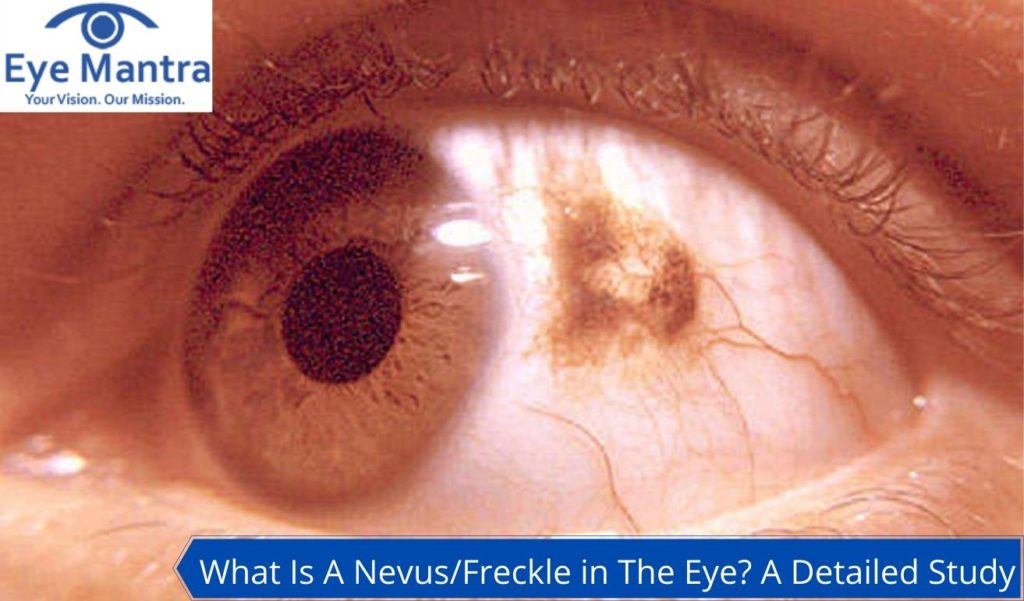Contents
What Is Eye Nevus?
A freckle in the eyes is called ‘Nevus’. Just like a freckle on the skin, it is harmless. But it still needs to be watched over time. Freckle can be of various types but some of them may not be visible with eyes sometimes and only an ophthalmologist can see it.
You might recently discover that you have an eye problem during your examination. Spots on your eye may seem strange, but they are normal and usually harmless.
The occurrence of the spots is rare, but it can turn into a type of cancer called Melanoma. So, whether they are old or new, it is always a good idea to get them tested.
Some of these nevi(plural) are easy to spot. But some are hidden behind your eyes, therefore, it is very difficult to spot them on your own.
One of the common types of nevus is called Iris Freckles. These are small bumps on the coloured part of your eye. They are more like spots on your skin and are present in the area of your eye and do not affect its structure. About half of all people have iris freckles. Some forms of nevi are formed before birth, while iris freckles may be seen in adults.
Type of Nevus
Conjunctiva Nevus
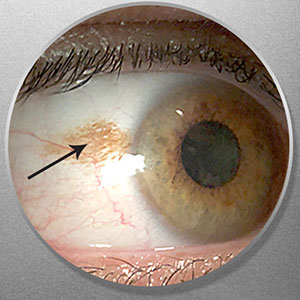
The conjunctiva nevus is a scar on the white part of the eye, known as the conjunctiva. These nerves make up more than half of all joint lesions and are usually from childhood.
Iris Nevus
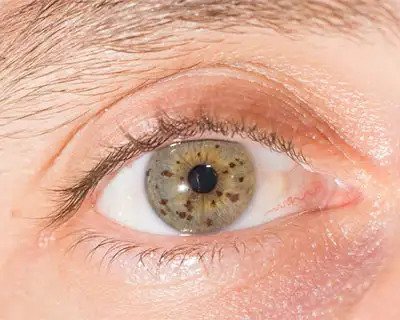
When the eye freckle is in the iris (the coloured part of the eye), it is called the iris nevus. About 6 out of 10 people have one.
Studies have linked increased sun exposure to the formation of new iris nevi, but more studies need to be done. They are always flattened and do not pose a threat. This is different from the mass enlarged in the iris or iris melanoma.
Choroidal Nevus
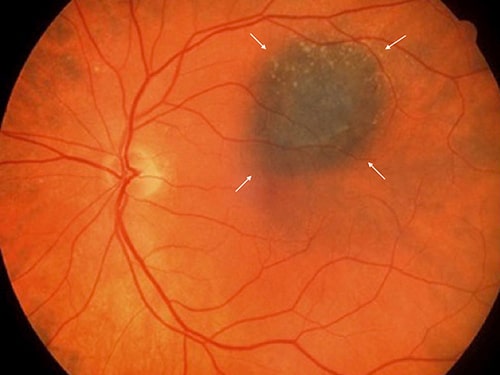
When your doctor tells you that you have an eye infection that needs to be followed, they may refer you to a choroidal nevus. This is a flat, malignant, non-cancerous lesion that is located on the back of the eye.
What Causes Eye Nevus?
There are different types of eyes and each can have different problems. It is important that the spots are checked by an optometrist to ensure a proper diagnosis and treatment plan.
While you may be born with clear eyesight, but eye problems can disrupt that later in life. Like freckles on the skin, this is caused by melanocytes (cells containing pigment) that are grouped. However, there are some other factors that can play a part in causing eye nevus like-
Race: One type of eye nevus called ‘Choroidal Nevi’ is present in the back part of the eyes, and is more commonly found in people with lighter skin tones than in black people. It may be due to melanin.
Exposure to sun: Studies claim that people who are being exposed to the sun for a prolonged period of time are more likely to develop nevus. It’s possible that sun damage can increase the chances of getting eye freckles.
Symptoms Associated With Nevus In The Eye
Conjunctival nevi usually appear as a freckle and are visible in the white part of the eye, with no other symptoms. They tend to remain stable but can change colour over time, especially during adolescence or pregnancy. The colour black can be mistaken for growth, which is why this type of nevi must be closely monitored.
The iris nevi may be seen by eye examination, especially if you have a black iris. They occur most often in people with blue eyes and are easily seen by these people.
Choroidal nevi are generally disease-free, although they can leak fluid or accompany abnormal blood vessel growth.
Sometimes this creates a specific retinal problem or loss of vision, which is why it is very important to monitor these types of nevi. Because they do not cause symptoms, they are usually diagnosed during a general Fundoscopic Examination.
Can Eye Freckles Cause Problems?
Although most freckles are always cancer-free, the optometrist must monitor them. There is little chance that they may develop into eye melanoma. If you notice that the nevus is starting to change, it can be treated quickly. Before it becomes more serious, Closer examination is the key to detect any possible cancer changes and catch metastasis that may be premature. Your optometrist will check for nevus every six to 12 months, noting the size, shape, and height.
Rarely, some lesions may declare other conditions. If CHRPE (spot) is in both eyes, this may be a sign of a genetic condition called Familia Adenomatous Polyposis (FAP).
FAP is very rare. It causes 1 percent of new coloured cancers every year. Although rare, people with FAP have a 100 percent chance of developing cancer by age 40.
Risk factors of Melanoma
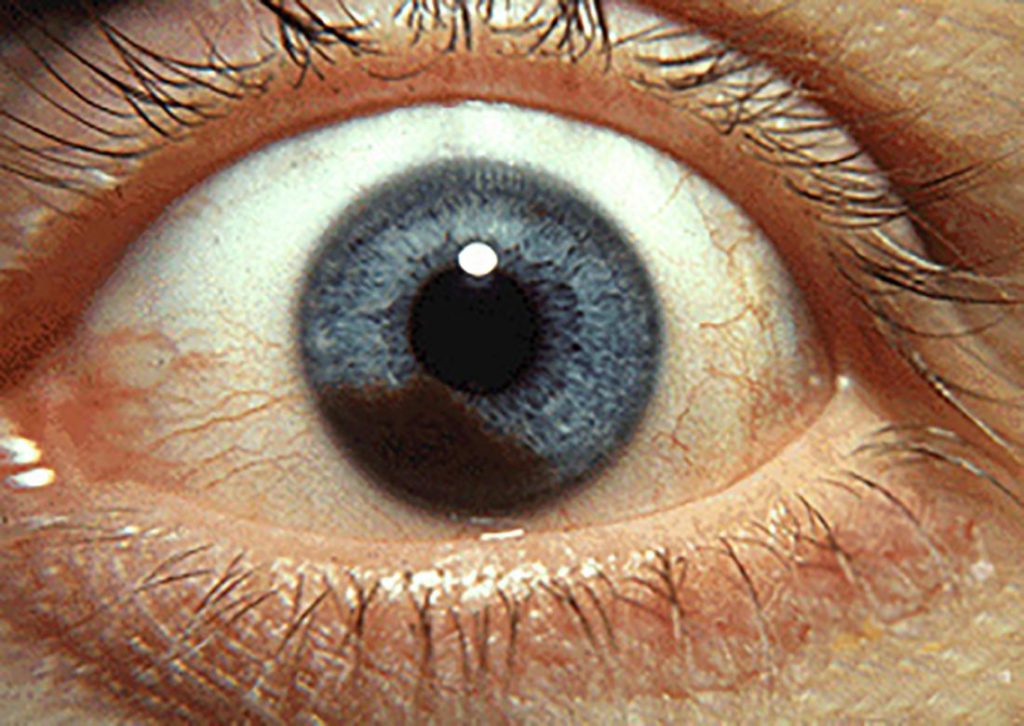
Melanoma developed from nevus can be caused under the following conditions-
- Race– White people have more risk of developing eye melanoma than people of other races.
- Light eye colour- A person with light eye colour such as blue, green is at a higher risk of melanoma than people with dark eyes.
- Age- The risk of getting melanoma increases with the increasing age.
- Inherited skin disorders- Some inherited syndromes like ocular melanocytosis- a condition in which increased pigmentation occurs at Uvea, and Dysplastic Nevus Syndrome- a condition that causes abnormal moles, can increase the risk of melanoma in the eye.
- Exposure to UV light- Ultraviolet rays are harmful to the eyes, however, they are more harmful if you have nevus. UV rays increase the risk of developing melanoma.
Do Eye Freckles Need Treatment?
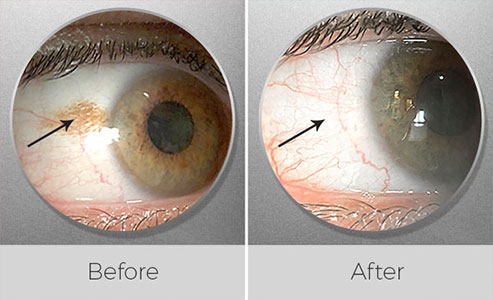
Most eye freckles are harmless, but if you have them, they need to be seen by an eye specialist with regular tests, usually every six months to a year, to record the size, shape, and colour changes of a freckle.
If the nevus needs to be removed due to certain complications, melanoma, or suspected melanoma, this is done surgically. Depending on the condition, local cuts (using a very small blade) or argon laser Photoablation (using a laser to remove tissue) are options.
How To Protect Your Eyes With Nevus?

Whether you have nevus or not it is important to take care of your eyes and protect them from any possible diseases. Always wear sunglasses when stepping out to protect them from harmful rays of the sun. UV rays can damage your eyes in many ways. And if you work at a place where there is more risk of hurting your eyes, then wear eye shields. People with eye Nevus should be more careful and ensure to wear sunglasses.
For any eye-associated problem, visit our hospital in Delhi now!
You may also contact us through our website- www.eyemantra.in
Call +91-9711115191 or mail us at [email protected] to book your appointment with us. Our team of great and experienced ophthalmologists will always suggest the best option for your eyes.
Also, read: Contact Lens Basics: All about Contact Lens
Eye pain: Symptoms, Causes, Diagnosis & Treatment

